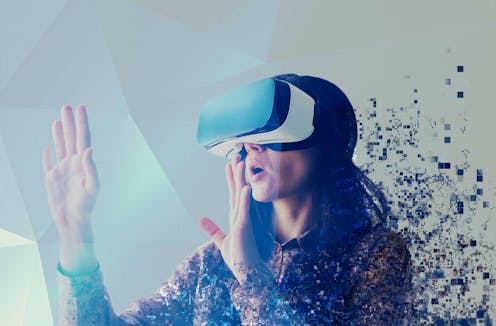
Most of the time, our brains are very good at blending together input from all our senses into a seamless, unified conscious experience of “my body”. When this process of integrating different sensory signals goes wrong, according to one theory, it can give a person an inaccurate and distressing sense of their body called “body image disturbance”.
There are many kinds of body image disturbance, including dissatisfaction with our bodies or inaccurate perceptions of them. We don’t know a lot about how many people experience body misperceptions, but we do know body dissatisfaction is very common. A survey of more than 1,600 Australians aged 12–18 carried out last year found almost half experienced dissatisfaction with their own appearance.
Body image disturbance is strongly linked to eating disorders and body dysmorphic disorder (which involves perceived flaws in one’s appearance). Existing treatments for these disorders have high relapse rates.
In our latest paper, my colleagues and I reviewed the evidence that a surprising approach may be able to help address the root cause of these disorders and potentially improve symptoms: “embodiment illusions”, which use virtual reality or other methods to trick the mind into feeling it inhabits a different body or body part.
Malleable body image
Perhaps the best-known embodiment illusion is the “rubber hand illusion”. If you show a person a rubber hand being stroked while simultaneously stroking their hand (which they cannot see), the combined visual and tactile sensations usually make the person feel like they “own” the rubber hand.
Using virtual reality, this illusion can also be extended to other body parts or even an entire body.
In our systematic review of 32 earlier studies, we found compelling evidence that people with higher levels of body image disturbance tend to be more susceptible to such embodiment illusions compared to others.
Their greater malleability in remapping body image is consistent with theories suggesting body image disturbances involve impaired multisensory integration.
For example, reliance on vision over touch might lead a person to place more weight on seeing a thin reflection in the mirror than on feeling their own protruding ribs. This may be combined with expectations (such as “my body should be thinner”) overriding accurate sensory inputs.
Positive effects
We also found most studies showed tricking your brain into experiencing these illusions had some positive effects. Participants improved their perceptual distortions and distressing thoughts and emotions about body size and shape.
The idea is to experience an artificial body as one’s own, especially if that body appears to have a desirable shape or size. This can “update” an individual’s stubborn distorted mental representation about their actual physical appearance.
One study involved women with anorexia nervosa using a healthy-weight virtual reality avatar. Afterward, they overestimated the size of their own (real) bodies less than before the experiment.
Another study reported that healthy women felt thinner and less dissatisfied with their bodies after identifying with a thin virtual body.
New treatments needed
Treating conditions related to body image, such as eating disorders and body dysmorphic disorder, can be highly challenging. Recovery can take a long time.
The first line of treatment for many such disorders is cognitive behavioural therapy, which mainly targets negative thoughts, emotions and behaviours related to the body. However, relapse rates are high.
This is one reason to seek new supplementary treatments that directly address body misperception. This is where embodiment illusions that can shift distorted perceptions may be helpful.
Many questions remain
There are still many things we don’t know about how embodiment illusions may affect people with body misperceptions, such as how long potential treatments should last or how long their effects will persist. We also need better ways to measure body image disturbances. Another limitation of existing research is a bias towards participants from Western cultures.
Future research may also study “enfacement illusions”, which induce a sense of ownership over another face. These may help us understand and improve facial misperception, particularly in people with body dysmorphic disorders.
Messing with a person’s perception of their physical self is inherently risky. Research is also needed into potential adverse effects of these illusions, such as increases in misperception of body size or shape.
Ethical concerns exist, too. Could experiencing a “healthy-weight” body reduce an anorexic person’s motivation for gaining weight, even if they are dangerously underweight?
Despite these questions, the use of immersive illusions to temporarily remap body image shows promise. It may offer an innovative complementary approach for understanding and treating distressing body image distortions, alongside current treatments.
The author would like to thank her supervisors, Associate Professor Isabel Krug at the University of Melbourne and Dr David Butler at the Cairnmillar Institute.
Jade Portingale does not work for, consult, own shares in or receive funding from any company or organisation that would benefit from this article, and has disclosed no relevant affiliations beyond their academic appointment.
This article was originally published on The Conversation. Read the original article.







